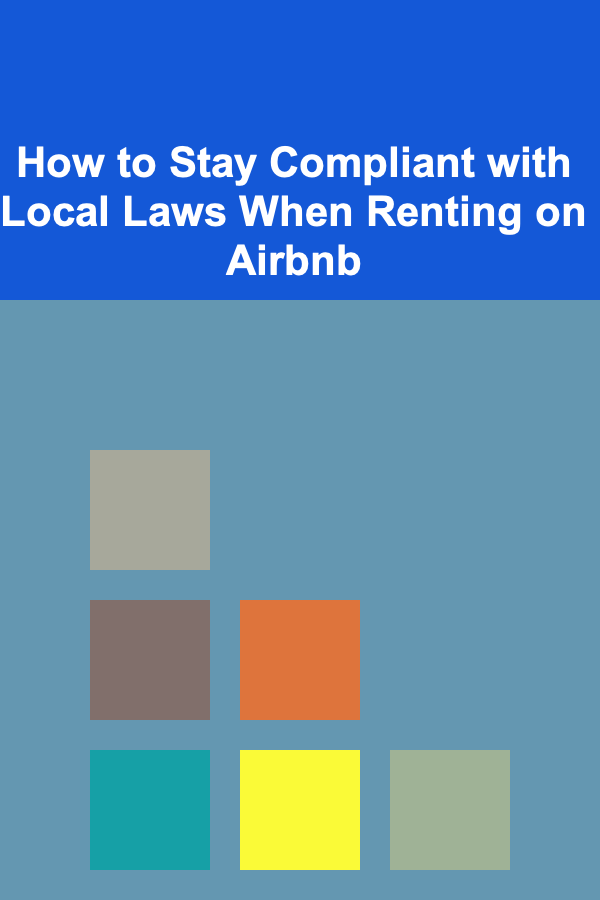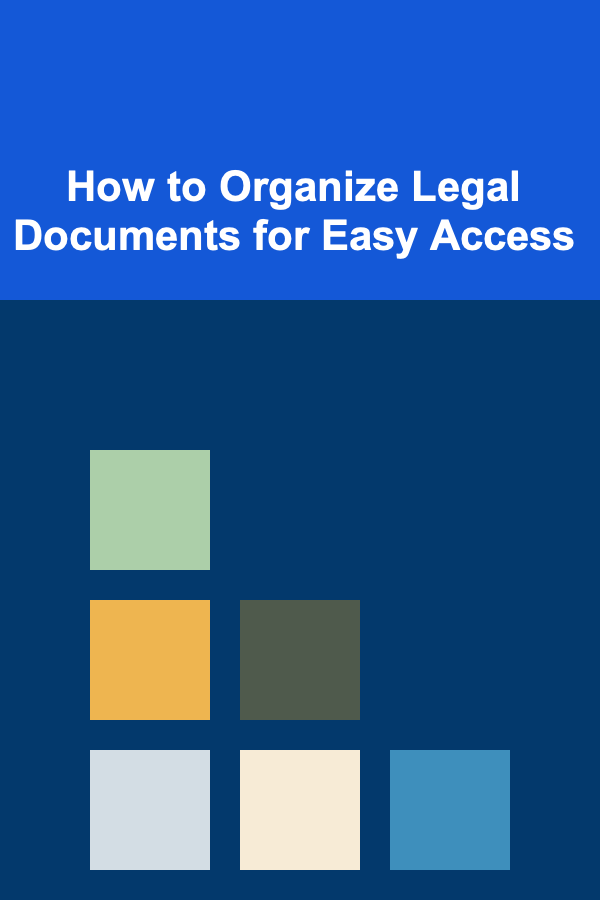
How to Stay Compliant with Local Laws When Renting on Airbnb
ebook include PDF & Audio bundle (Micro Guide)
$12.99$6.99
Limited Time Offer! Order within the next:

Renting out your property on Airbnb can be a lucrative venture, but it comes with its own set of challenges, particularly when it comes to navigating the complex web of local laws and regulations. Failing to comply with these laws can result in hefty fines, penalties, or even the removal of your listing. This guide will provide you with actionable steps to ensure you remain compliant with local laws when renting your property on Airbnb.
Understand the Local Regulations
Before you list your property on Airbnb, it's crucial to understand the legal framework in your location. Regulations vary widely depending on your city, state, or country, and they can change frequently. Here's how to begin:
Research Local Laws
Start by researching the laws and regulations regarding short-term rentals in your area. This might include zoning laws, rental licenses, taxes, and building codes. Some cities may have special rules that apply only to Airbnb-type rentals, while others may regulate all short-term leases.
Examples of Common Local Laws:
- Zoning Laws: These laws dictate where short-term rentals are permitted. In some cities, rentals may only be allowed in residential zones or in certain types of properties.
- Licensing and Permits: Many cities require hosts to obtain a license or permit to legally rent their property on Airbnb. Failure to do so may result in fines or the removal of your listing.
- Health and Safety Codes: These regulations ensure that your property meets basic safety standards, such as smoke detectors, fire extinguishers, and adequate exits in case of emergency.
Use Airbnb's Tools and Resources
Airbnb offers resources that can help you navigate local laws. The platform provides a "Learn About Your City's Regulations" tool, where you can find information on local rules, taxes, and licensing requirements. While these resources are helpful, they shouldn't be your only source of information. Always double-check with local government offices or legal experts.
Consult with a Local Attorney
If you're unsure about specific regulations, it's a good idea to consult with a local attorney who specializes in real estate or rental law. An attorney can help you understand the legal landscape in your area and ensure you're fully compliant.
Obtain Necessary Permits and Licenses
In many locations, operating an Airbnb rental without the proper permits is illegal. To avoid penalties, take the necessary steps to obtain the appropriate licenses and permits. Here's what you should do:
Apply for a Short-Term Rental License
Some cities require short-term rental operators to apply for a specific license. The process for obtaining this license can vary, but typically, you'll need to fill out an application, pay a fee, and sometimes provide proof that your property complies with local safety and health codes.
For example:
- San Francisco requires hosts to register with the city and obtain a short-term rental certificate.
- New York City has a ban on entire apartment rentals for fewer than 30 days unless the host is present during the stay, and there are strict rules around licensing.
Make sure you check the exact requirements in your area. In some places, failure to register could result in fines or legal action.
Comply with Other Local Requirements
In addition to a rental license, you may need to meet other local requirements. These could include:
- Insurance: Some jurisdictions require hosts to carry special insurance for short-term rentals.
- Business License: In some areas, you may need a business license to operate a rental property.
- Building Safety Inspections: Local authorities may require your property to pass a safety inspection to ensure it meets health and safety standards.
Ensure you have all the necessary paperwork and approvals before accepting guests.
Collect and Remit Taxes
In many regions, short-term rentals are subject to various taxes. Failing to collect and remit these taxes can lead to significant fines. Here's how you can stay on top of your tax obligations:
Understand the Tax Types You Need to Pay
The types of taxes you may be required to pay on your Airbnb income depend on your location, but common taxes include:
- Hotel Tax or Occupancy Tax: Many jurisdictions impose a tax on short-term rentals, often referred to as a hotel tax or occupancy tax. The rate can vary from 1% to over 15% of the rental amount.
- Sales Tax: Some states or countries charge sales tax on short-term rentals.
- Income Tax: Earnings from your Airbnb rental are typically considered taxable income and must be reported on your tax returns.
Use Airbnb's Tax Collection System
In some areas, Airbnb automatically collects taxes on your behalf and remits them to local authorities. Airbnb's tax collection system is available in various regions, such as the European Union, Canada, and some U.S. states. If you're located in a region where Airbnb handles tax collection, ensure that this system is activated for your listing.
However, in many cases, you'll need to handle tax payments yourself. Be sure to check with your local tax authority for the specific tax rates and procedures for your location.
Keep Detailed Records
Maintain accurate records of all transactions, including rental income, taxes collected, and any deductions you may be eligible for. This documentation will help you when it's time to file your taxes and ensure you comply with all tax obligations.
Follow the Rules for Maximum Rental Duration
Some cities or municipalities have rules about how long you can rent out your property on Airbnb. These restrictions often limit the number of days per year that a property can be rented out as a short-term rental.
Be Aware of Rental Caps
Some cities impose caps on the number of days per year you can rent out your property on platforms like Airbnb. For example:
- Los Angeles limits short-term rentals to 120 days per year for entire homes and 365 days per year for private rooms.
- Paris has strict limits on the duration of short-term rentals, with a maximum of 120 days per year for entire homes.
Make sure to check the specific rules in your location to avoid running afoul of these limits.
Maintain Your Property to Meet Local Standards
Aside from legal and administrative requirements, it's also essential to keep your property in good condition to comply with local health and safety standards. Here are a few key points to consider:
Ensure Compliance with Safety Standards
Local regulations often mandate certain safety features in rental properties, such as:
- Smoke and Carbon Monoxide Detectors: These are essential for the safety of your guests and often required by law.
- Fire Extinguishers: Many regions require that your property be equipped with fire extinguishers in accessible locations.
- Emergency Exits: Ensure that your property has easily accessible exits in case of emergency.
Address Health and Sanitation Codes
Some areas have strict rules regarding cleanliness and sanitation in short-term rentals. For example, some cities require that rental properties be cleaned between stays to prevent the spread of illness. Make sure your property is up to code in terms of cleanliness and hygiene standards.
Be Transparent with Your Guests
Finally, it's important to maintain transparency with your guests about the legal requirements that apply to your property. This will help you avoid misunderstandings and ensure that guests know what to expect during their stay.
Inform Guests About Local Rules
Consider providing a welcome guide or message to your guests, explaining any local rules that may apply. For instance:
- Noise regulations: Some cities have quiet hours in residential areas.
- Garbage disposal: In some areas, there are specific rules for trash collection and recycling.
- Parking restrictions: If parking is limited or restricted in your area, make sure guests are aware.
By being transparent, you help ensure that both you and your guests are complying with local laws and regulations.
Conclusion
Staying compliant with local laws when renting on Airbnb may seem daunting, but it is entirely achievable with proper research and attention to detail. By understanding local regulations, obtaining the necessary permits, collecting and remitting taxes, and maintaining your property to meet safety standards, you can operate your Airbnb rental legally and avoid costly fines or legal issues. Always stay informed about changes in local laws and consult legal professionals when necessary to ensure your rental business remains compliant.
Reading More From Our Other Websites
- [Skydiving Tip 101] Extreme Heights: Exploring Record-Breaking Skydiving Altitudes
- [Personal Care Tips 101] How to Apply Toner for Maximum Benefits
- [Personal Finance Management 101] How to Build a Financial Safety Net for Your Family
- [Home Family Activity 101] How to Create a DIY Pizza Night at Home
- [Home Soundproofing 101] How to Reduce Noise from Neighbors: Simple Solutions for Quieter Living
- [Home Security 101] How to Identify Weak Points in Your Home's Security
- [Gardening 101] The Best Plants for a Low-Maintenance Shade Garden
- [Simple Life Tip 101] How to Cultivate a Simple Mindset Through Daily Gratitude Practices
- [Biking 101] Cyclocross vs. Road Bikes: What's the Difference and Which Should You Choose?
- [Home Space Saving 101] How to Fit Your Home Gym Equipment into a Small Room

Evolving Digital Media Landscape: Opportunities and Challenges for Advertising Executives
Read More
How to Create a Neutral Backdrop to Attract Buyers
Read More
How to Invest in Startups and Early-Stage Businesses
Read More
How to Organize Legal Documents for Easy Access
Read More
How to Test Your Website Before Launch: A Complete Checklist
Read More
How to Integrate Kanban Boards into Your Project To-Do List Workflow
Read MoreOther Products

Evolving Digital Media Landscape: Opportunities and Challenges for Advertising Executives
Read More
How to Create a Neutral Backdrop to Attract Buyers
Read More
How to Invest in Startups and Early-Stage Businesses
Read More
How to Organize Legal Documents for Easy Access
Read More
How to Test Your Website Before Launch: A Complete Checklist
Read More